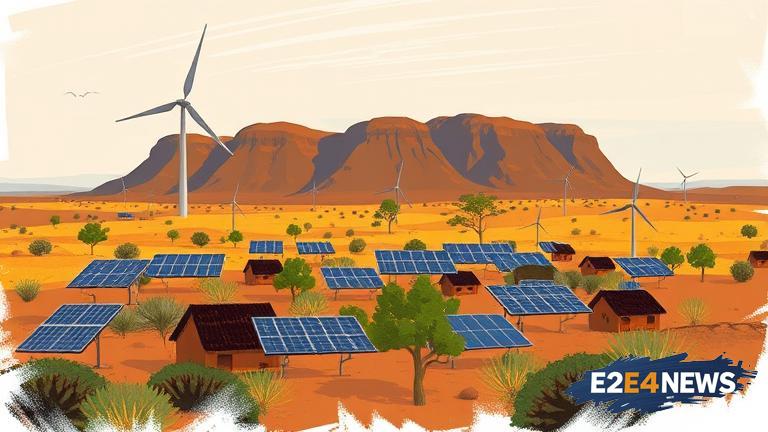The African continent is witnessing a significant shift towards renewable energy, driven by the need to address the pressing issues of energy access, climate change, and sustainable development. With many countries still struggling to provide electricity to their populations, renewable energy has emerged as a viable solution. Solar and wind power are becoming increasingly popular, with many African nations investing heavily in these sectors. For instance, South Africa has set ambitious targets to increase its renewable energy capacity, aiming to reduce its reliance on coal-fired power plants. Similarly, Kenya has made significant strides in harnessing geothermal energy, with the Olkaria Geothermal Complex being one of the largest in the world. Other countries, such as Egypt and Morocco, are also actively promoting renewable energy, with a focus on solar and wind power. The African Union’s Agenda 2063 has set a target of ensuring universal access to clean and affordable energy by 2030, which has further accelerated the adoption of renewable energy. The International Renewable Energy Agency (IRENA) has also launched several initiatives to support the development of renewable energy in Africa. Furthermore, the African Development Bank has committed to investing $25 billion in renewable energy projects across the continent by 2025. The private sector is also playing a crucial role, with companies such as Vestas and Siemens Gamesa investing in wind energy projects in Africa. Additionally, the use of renewable energy is creating new job opportunities and stimulating local economies. However, despite the progress made, there are still significant challenges to be addressed, including the lack of infrastructure, limited access to financing, and the need for policy and regulatory frameworks to support the development of renewable energy. To overcome these challenges, African countries must work together to share knowledge, expertise, and best practices. The development of regional power pools and the creation of a unified African energy market can also help to accelerate the adoption of renewable energy. Moreover, the involvement of international organizations, such as the United Nations and the European Union, can provide critical support and funding for renewable energy projects. In conclusion, the renewable energy revolution in Africa is gaining momentum, with many countries making significant strides in harnessing the potential of solar, wind, and geothermal energy. As the continent continues to grow and develop, it is essential that renewable energy remains at the forefront of the energy agenda, ensuring a sustainable and prosperous future for all Africans. The benefits of renewable energy are numerous, including reduced greenhouse gas emissions, improved air quality, and enhanced energy security. Moreover, the use of renewable energy can also help to promote economic development, create jobs, and stimulate local economies. However, to fully realize the potential of renewable energy, African countries must address the existing challenges and work together to create a unified and coordinated approach to energy development. By doing so, Africa can emerge as a leader in the global transition to a low-carbon economy, ensuring a bright and sustainable future for generations to come. The adoption of renewable energy can also help to reduce the continent’s dependence on fossil fuels, which are a major contributor to climate change. Furthermore, the use of renewable energy can help to improve energy access, particularly in rural areas where access to electricity is often limited. In addition, the development of renewable energy can also help to promote energy efficiency, reduce energy poverty, and enhance energy security. Overall, the future of renewable energy in Africa looks promising, with many opportunities for growth and development. As the continent continues to transition towards a low-carbon economy, it is essential that renewable energy remains a key priority, driving sustainable development and ensuring a prosperous future for all Africans.
